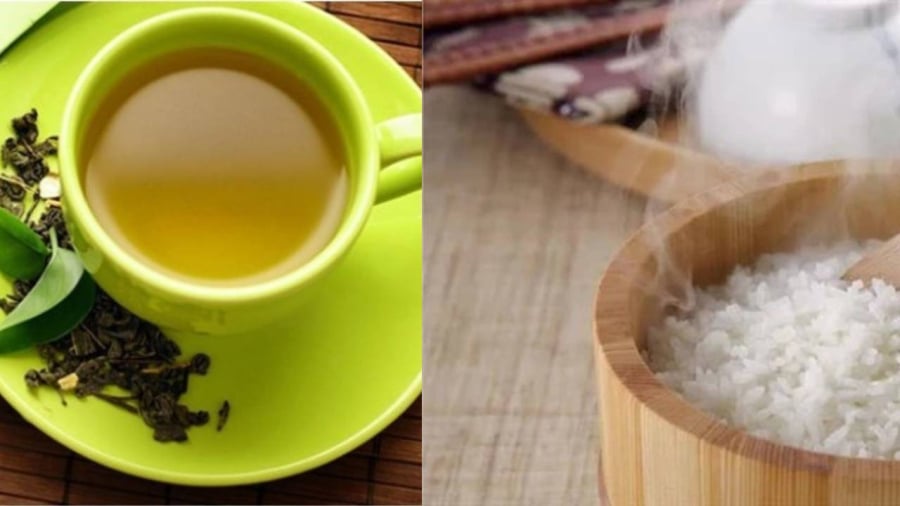Use this water to cook rice for a healthy heart
Usually, we use filtered water to wash and cook rice. But in reality, there is another nutritious way to cook rice: by using green tea water.
In the ancient Chinese medical book “Shen Nong’s Materia Medica,” it is stated that “drinking tea regularly can make the body slender and healthy.” During the Tang Dynasty, rice cooked with tea was also praised for its health benefits, indicating that cooking rice with tea has been a folk tradition passed down for thousands of years in China and has significance in Traditional Chinese Medicine.

Cooking rice with green tea
Cooking rice with tea is a way to promote cardiovascular health. This is because tea water contains 70-80% polyphenol extract, and research has shown that polyphenols in tea can enhance the microcirculation’s recovery ability, prevent capillary rupture and bleeding. Furthermore, polyphenols can reduce blood cholesterol, inhibit arterial plaque formation. Middle-aged and elderly people who regularly eat rice cooked with tea have the effect of softening blood vessels, lowering blood lipids, and preventing cardiovascular diseases.
What other benefits does cooking rice with tea bring to the body?
Rice cooked with tea reduces blood fat
Tea-cooked rice is rich in statins, which have the antioxidant effect on lipids. It can reduce the levels of low-density lipoprotein, bad cholesterol, and neutral fat in human blood, effectively reducing blood fat.
Prevention and treatment of cardiovascular diseases
Green tea can remove grease, clean the mouth, dissolve food, and aid digestion. In addition, tea water contains 70-80% polyphenol extract, and research has shown that polyphenols in tea can enhance the microcirculation’s recovery ability, prevent capillary rupture and bleeding.
Furthermore, polyphenols can reduce blood cholesterol, inhibit arterial plaque formation. Middle-aged and elderly people who regularly eat rice cooked with tea have the effect of softening blood vessels, lowering blood lipids, and preventing cardiovascular diseases.
Anti-aging effects
In addition to its preventive health benefits, tea also has beauty and anti-aging effects. For example, tea is rich in vitamin A, C, B, E, K, and tannins. These components have many antioxidants, which can accelerate the body’s metabolism process, dilute pigments, and make the skin whiter, brighter, and smoother.
Protecting teeth and preventing cavities
The fluoride in tea has a whitening and cleansing effect on teeth. When rice is cooked with a certain amount of tea water, it can enhance the elasticity and acid resistance of teeth, while also preventing cavities.
Supporting digestion
Tea water can dissolve fats in food. The phenols in tea water can promote the production of digestive enzymes in the human body. Therefore, people with digestive problems can use green tea to cook rice to aid digestion.
Preventing stroke
One of the causes of stroke is related to the production of lipid peroxides in the body, which causes blood vessels to lose elasticity. Tannic acid in tea inhibits the production of lipid peroxides, thus preventing and treating strokes effectively.
Lowering blood sugar
Polysaccharides in tea can reduce the production of gluconeogenesis and glycogen by enhancing the antioxidant function and glucokinase activity of the liver. This can reduce blood sugar levels when fasting.
Note: Do not let tea leaves fall into the rice, do not use too much tea when cooking rice, and do not keep steeped tea overnight for cooking rice. When eating rice cooked with tea, it is advisable to consume foods high in protein and iron.





































